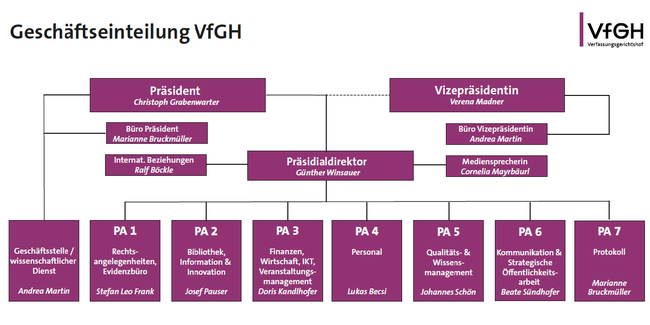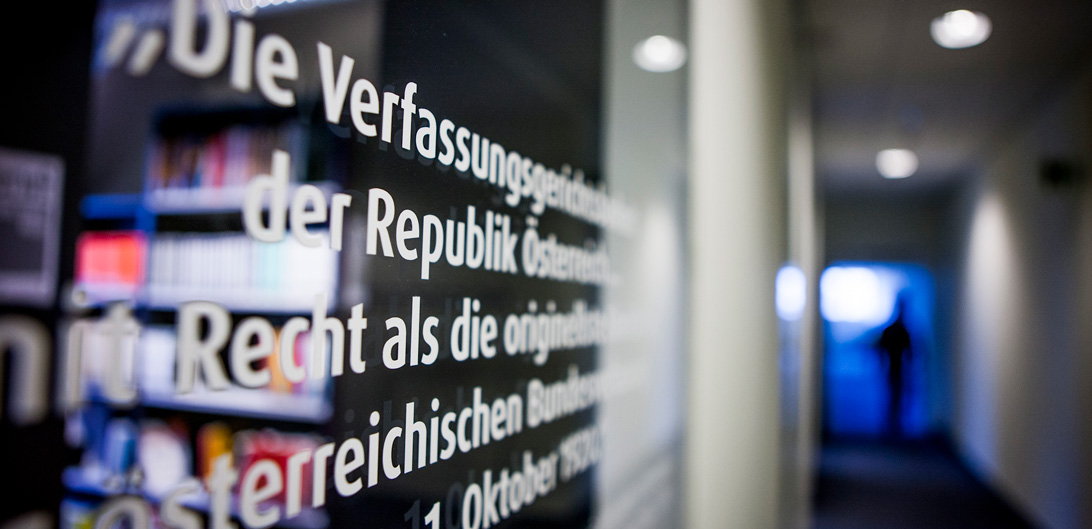Management, Administration of Justice and Scientific Service
Management
The President heads the Constitutional Court and supervises its operational management. Besides the Court’s judicial activities, the management function also includes the external representation of the Court and the administration of justice. The latter comprises all matters relating to the internal organisation of the Court, its staff, the budget of the Court, and the supervision of compliance with service rules and regulations.
Administration of Justice
The President’s Directorate supports the President in the management of the Constitutional Court. It consists of several presidential departments. The Presidential Directorate is under the authority of the Chief Executive Director, who also exercises official supervision over all employees of the Constitutional Court.
The Presidential Department "Legal Affairs and Registry" supports and advises the President in preparing and conducting the sessions of the Constitutional Court, but also in general legal matters. It also deals with matters that are brought to the Court's attention within the framework of the citizens' service.
The main task of the Registry unit is to record all judgments rendered by the Court and to edit them in database format (cf. here). The edited judgments are transmitted in abridged form and in full to the “Constitutional Court” database in the Legal Information System of the Republic of Austria at least once a week. Thus, the judgments are accessible to the interested public free of charge not later than one week after service upon the parties concerned. Moreover, the archiving unit also replies to questions received by telephone, in writing or by email regarding the jurisprudence of the Court. Within the department, the Registry is responsible for the processing and management of files, contacts with interested parties during office hours, and session management.
The staff unit "Office/Scientific Service" is responsible for the file processing, the file management, the communication with parties as well as the session management; it is also involved in the training and further training of the constitutional law staff.
The Presidential Department "Library, Informtation and Innovation" is entrusted with the acquisition, provision and indexing of literature and other information carriers. Together with the ICT management, it pays special attention to unrestricted and rapid access to external information sources (legal databases). It is the first point of contact for all questions regarding legal research. In addition to library management, it is also responsible for the maintenance and editing of the intranet and the website of the Constitutional Court, as well as for publication management.
The Presidential Department "Finance, Economy, ICT, Event Management" is responsible for the entire budget management, budget controlling and facility management. ICT Management ensures an up-to-date electronic infrastructure. In addition to the usual office products and programme packages for the administration, specific programmes for the judiciary (electronic court registry, electronic case file, decision documentation, statistics) are developed and used.
The personnel matters of the Constitutional Court are handled by the Presidential Department "Personnel Management".
The Presidential Department "Quality and Knowledge Management" supports the President in judicial matters and assists the divisions in preparing cross-cutting legal issues and coordinating asylum cases. It is responsible for organisational quality and knowledge management, planning the content of information and training events on constitutional and asylum law, and helping to train constitutional law staff.
Presidential Department "Communication and Strategic Public Relations" manages communication activities, including technical design and operational implementation, and manages information projects (e.g., Constitution in Schools, Constitution in Dialogue, etc.). It also coordinates projects with the Constitution Forum Foundation.
The Presidential Department "National and International Protocol" takes care of the Constitutional Court's national and international representative duties.
The Media Spokesperson is in charge of informing the public, especially the media, about the work of the Constitutional Court (further information here).
The "Administrative Office/Research Department" reports directly to the President and is responsible for administrative file processing, file management, correspondence with parties and session management; it is also involved in the training and further education of constitutional law staff.

Scientific Service
The members of the scientific staff are qualified lawyers who, as a rule, spend several years of their professional career at the Constitutional Court. Under the leadership of the Permanent Reporters, they conduct the preliminary proceedings and support the preparation of draft decisions (research of literature and case law, preparation of the bases for decisions, proposals for further procedure). Moreover, they take minutes during the non-public sessions and public hearings of the Constitutional Court and supervise the drawing up of the judgments and decisions.

